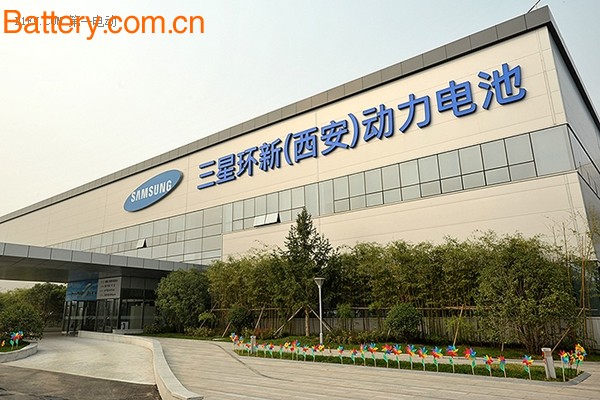The heat of new energy vehicles is increasing in China. As the core component of new energy vehicles, batteries are being “remembered†by more and more foreign companies. South Korea’s Samsung Group is one of them.
In the past two years, Samsung’s mobile phone market share has declined as the mobile phone business has been squeezed by Apple and Chinese mobile phone manufacturers. In order to seek a breakthrough, the battery business has become an important pillar of Samsung. The current demand for batteries in the Chinese market is quite large.
According to some data, as China becomes the world's largest electric vehicle market, the proportion of global car batteries in China is expected to reach 20% by 2020. This figure is 16% higher than in 2014. Statistics from the Zhiyan data center show that by 2020, China's demand for lithium batteries is expected to reach 7.55 billion.
This trend has caused strong concern from Samsung. At the end of 2014, the Samsung SDI battery factory was put into production in Xi'an, and its production line will produce 40,000 units of high performance below the cost price. The purpose is to fight the Chinese lithium battery manufacturers.

The reason why Samsung is so eager to distribute the battery business in China is because it once tasted the sweetness in the mobile phone field with its core components. In the smart phone market, although Apple is the only one, Samsung relies on its core advantages in mobile phone chips, screens, memory and other fields, and once let Apple love and hate it. Huawei also gradually resisted the Samsung Chamber after making breakthroughs in key components.
In the electric vehicle market, Samsung is using the same strategy to control key components such as lithium batteries in their hands, so as to grasp the right to speak in the field of electric vehicles. As the implementer of Samsung's power battery strategy, the strength of Samsung's Samsung SDI is indeed not to be underestimated. It is now the world's sixth-largest manufacturer of electric vehicle batteries, including international giants such as BMW, Chrysler and Volkswagen. Many domestic auto companies are also customers of the company.
However, Samsung’s strategy to try to divide the Chinese lithium battery market is being frustrated. Not long ago, the Ministry of Industry and Information Technology announced the "Automobile Power Battery Industry Standard Conditions" enterprise catalog (fourth batch), Samsung battery was not included. Many car companies have been able to enter the catalogue for new energy vehicles, receive government subsidies, and have given up orders with Samsung.
In this context, on July 21, a Samsung stake in BYD came to the surface. BYD announced that the company completed 57.40 yuan / share, non-public offering of 252 million shares, raising a total of 14.473 billion yuan. Among them, Shanghai Samsung Semiconductor Co., Ltd. subscribed for 52.26 million shares, totaling 3 billion yuan, which will hold 1.92% of the total share capital after the company's non-public offering. Shanghai Samsung Semiconductor Co., Ltd. is the sales legal person of Samsung Electronics Semiconductor in China.
South Korean media reported that Samsung Electronics will invest 500 billion won (about 3 billion yuan) in BYD. After BYD's new shares, Samsung will own a 4% stake in BYD. However, BYD said in the midday announcement that Samsung Electronics really intends to buy BYD's new shares, but the 4% share purchase is not true.
The announcement also shows that the funds raised will be used for iron-powered lithium-ion battery expansion projects, new energy vehicle R&D projects, and replenishment of working capital and repayment of bank loans. It is understood that Samsung Electronics has been providing BYD with a variety of sensors and other automotive semiconductors and LCDs. BYD provides Samsung Electronics with metal boxes and low-end batteries for smartphones. This investment is in line with the strategic interests of the two companies.
Obviously, Samsung is temporarily at a disadvantage when it is not conducive to its own policies and competes with Chinese battery manufacturers. At this point, Samsung chose the curve to enter the market, through the shareholding of BYD, seeking the possibility of layout in the Chinese battery market. According to the Korean media report, Samsung is unlikely to meet the requirements in terms of technical standards. The Chinese side has been reluctant to “releaseâ€, probably because of the protection of local battery factories.
This situation will definitely affect Samsung's future performance. According to statistics, in the first quarter of this year, the loss of Samsung SDI has reached nearly 600 million yuan. Samsung is clearly reluctant to see this happen, and it is trying more ways to enter the Chinese market.
Some media predicted that Samsung’s stake in BYD may have some action in the field of electric vehicles. In 2013, Samsung Motors announced that it had entered the field of electric vehicles after working with Renault. The electric car model SM3 launched that year was unremarkable. In cooperation with BYD, Samsung's own excellent battery technology and BYD's experience in electric vehicles can promote the further development of Samsung's electric vehicles and participate in the competition in the Chinese market in the form of electric vehicles.
Regardless of the way the Samsung battery is developed in the Chinese market, Chinese domestic battery companies must step up research and development to improve their market competitiveness. Otherwise, once Samsung has formed a scale in the Chinese electric vehicle market one day, independent auto companies can only take into account their own interests.
ZHEJIANG FULE MINING MACHINERY CO., LTD , https://www.flmachines.com